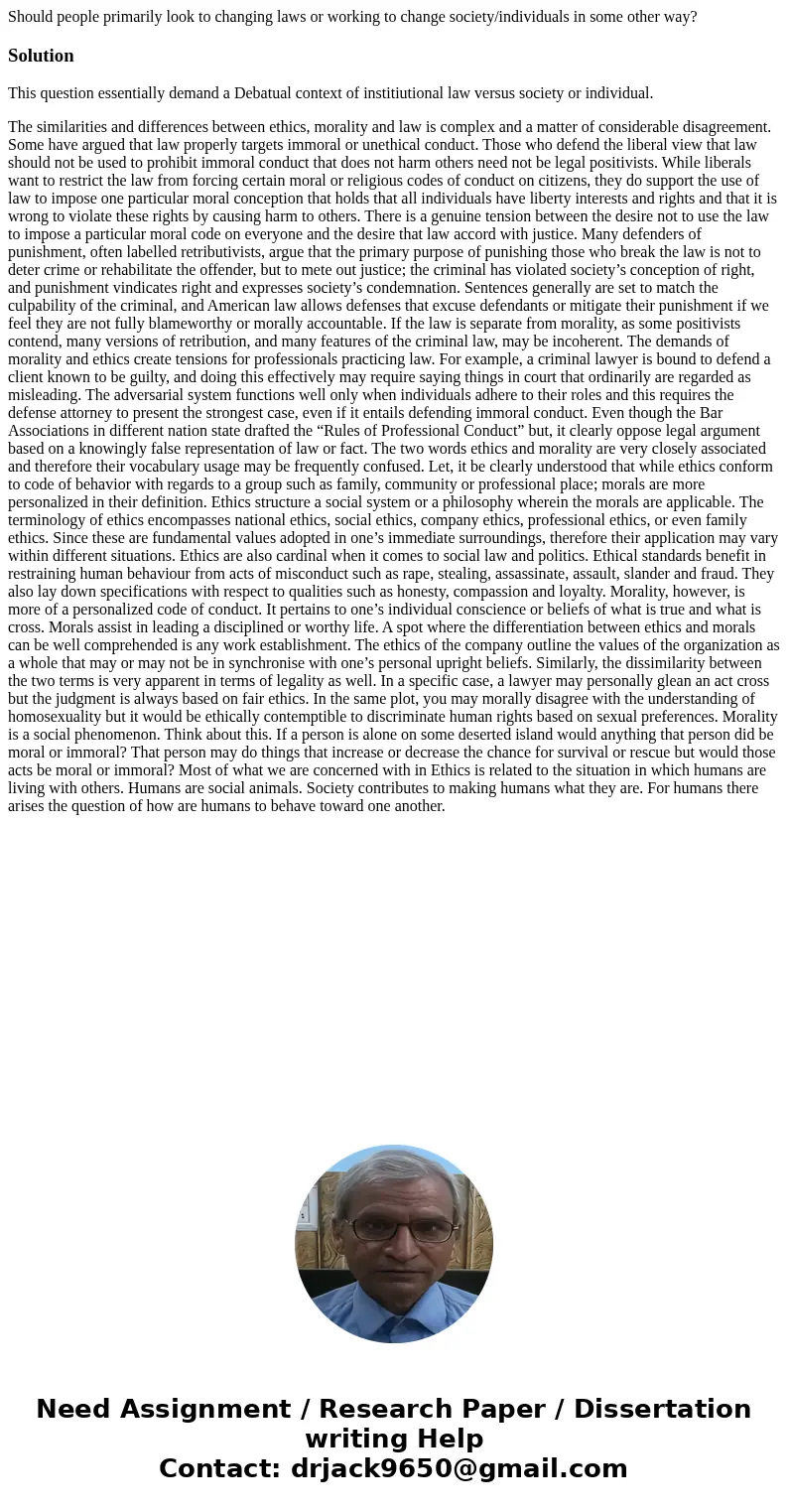Should people primarily look to changing laws or working to
Should people primarily look to changing laws or working to change society/individuals in some other way?
Solution
This question essentially demand a Debatual context of institiutional law versus society or individual.
The similarities and differences between ethics, morality and law is complex and a matter of considerable disagreement. Some have argued that law properly targets immoral or unethical conduct. Those who defend the liberal view that law should not be used to prohibit immoral conduct that does not harm others need not be legal positivists. While liberals want to restrict the law from forcing certain moral or religious codes of conduct on citizens, they do support the use of law to impose one particular moral conception that holds that all individuals have liberty interests and rights and that it is wrong to violate these rights by causing harm to others. There is a genuine tension between the desire not to use the law to impose a particular moral code on everyone and the desire that law accord with justice. Many defenders of punishment, often labelled retributivists, argue that the primary purpose of punishing those who break the law is not to deter crime or rehabilitate the offender, but to mete out justice; the criminal has violated society’s conception of right, and punishment vindicates right and expresses society’s condemnation. Sentences generally are set to match the culpability of the criminal, and American law allows defenses that excuse defendants or mitigate their punishment if we feel they are not fully blameworthy or morally accountable. If the law is separate from morality, as some positivists contend, many versions of retribution, and many features of the criminal law, may be incoherent. The demands of morality and ethics create tensions for professionals practicing law. For example, a criminal lawyer is bound to defend a client known to be guilty, and doing this effectively may require saying things in court that ordinarily are regarded as misleading. The adversarial system functions well only when individuals adhere to their roles and this requires the defense attorney to present the strongest case, even if it entails defending immoral conduct. Even though the Bar Associations in different nation state drafted the “Rules of Professional Conduct” but, it clearly oppose legal argument based on a knowingly false representation of law or fact. The two words ethics and morality are very closely associated and therefore their vocabulary usage may be frequently confused. Let, it be clearly understood that while ethics conform to code of behavior with regards to a group such as family, community or professional place; morals are more personalized in their definition. Ethics structure a social system or a philosophy wherein the morals are applicable. The terminology of ethics encompasses national ethics, social ethics, company ethics, professional ethics, or even family ethics. Since these are fundamental values adopted in one’s immediate surroundings, therefore their application may vary within different situations. Ethics are also cardinal when it comes to social law and politics. Ethical standards benefit in restraining human behaviour from acts of misconduct such as rape, stealing, assassinate, assault, slander and fraud. They also lay down specifications with respect to qualities such as honesty, compassion and loyalty. Morality, however, is more of a personalized code of conduct. It pertains to one’s individual conscience or beliefs of what is true and what is cross. Morals assist in leading a disciplined or worthy life. A spot where the differentiation between ethics and morals can be well comprehended is any work establishment. The ethics of the company outline the values of the organization as a whole that may or may not be in synchronise with one’s personal upright beliefs. Similarly, the dissimilarity between the two terms is very apparent in terms of legality as well. In a specific case, a lawyer may personally glean an act cross but the judgment is always based on fair ethics. In the same plot, you may morally disagree with the understanding of homosexuality but it would be ethically contemptible to discriminate human rights based on sexual preferences. Morality is a social phenomenon. Think about this. If a person is alone on some deserted island would anything that person did be moral or immoral? That person may do things that increase or decrease the chance for survival or rescue but would those acts be moral or immoral? Most of what we are concerned with in Ethics is related to the situation in which humans are living with others. Humans are social animals. Society contributes to making humans what they are. For humans there arises the question of how are humans to behave toward one another.

 Homework Sourse
Homework Sourse